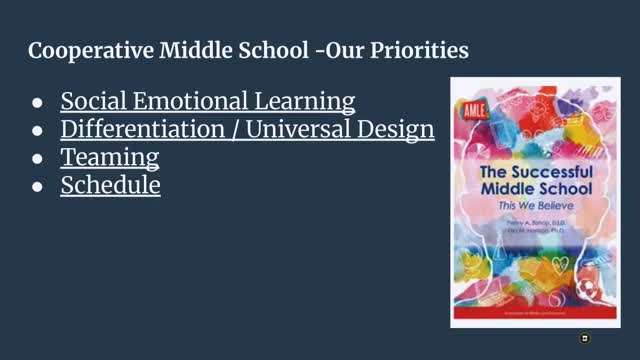Cooperative Middle School unveils new grading system and expands support programs
April 17, 2025 | Exeter Region Coop School District, School Districts, New Hampshire
Thanks to Scribe from Workplace AI , all articles about New Hampshire are free for you to enjoy throughout 2025!

This article was created by AI using a video recording of the meeting. It summarizes the key points discussed, but for full details and context, please refer to the video of the full meeting. Link to Full Meeting
The meeting highlighted four key priorities identified through stakeholder input, including social-emotional learning, differentiation and universal design, effective teaming, and the master schedule. These priorities aim to create a more inclusive and supportive educational environment for all students. The MTSS framework is divided into two main components: MTSS A, which focuses on academics, and MTSS B, which addresses behavioral support. Each component is further divided into three tiers of support, ranging from universal strategies for all students to more intensive interventions for those requiring additional assistance.
Miss Berg, an educator at Cooperative Middle School, elaborated on the importance of Professional Learning Communities (PLCs) in fostering collaboration among teachers. These PLCs provide dedicated time for educators to discuss student learning, share strategies, and analyze data to improve teaching practices. The emphasis on collective responsibility ensures that all students receive the support they need to succeed.
A notable moment during the meeting was the presentation of a video by the STEAM team, showcasing how PLCs have enhanced curriculum development and community engagement. The team emphasized the importance of staying current with technological advancements and creating opportunities for students to showcase their learning through community events.
As the district prepares for the upcoming academic year, significant changes to the grading system were proposed. The shift from a five-level grading scale to a four-level scale aims to align grading practices across all grade levels, ensuring consistency from elementary through high school. This new system will incorporate both formative and summative assessments, allowing for a more comprehensive evaluation of student performance.
The board discussed the implications of these changes, emphasizing the need for approval to move forward with the new grading system. The conversation underscored a commitment to competency-based education, where students are assessed on specific skills and competencies rather than traditional content mastery alone.
As the meeting concluded, it was clear that the Exeter Region Cooperative School Board is dedicated to fostering an educational environment that prioritizes student well-being and academic success. The initiatives discussed not only reflect a proactive approach to education but also a collaborative spirit among educators, parents, and community members, setting the stage for a promising future for students in the district.
Converted from Exeter Region Cooperative School Board Meeting 04/15/25 meeting on April 17, 2025
Link to Full Meeting
Comments
View full meeting
This article is based on a recent meeting—watch the full video and explore the complete transcript for deeper insights into the discussion.
View full meeting